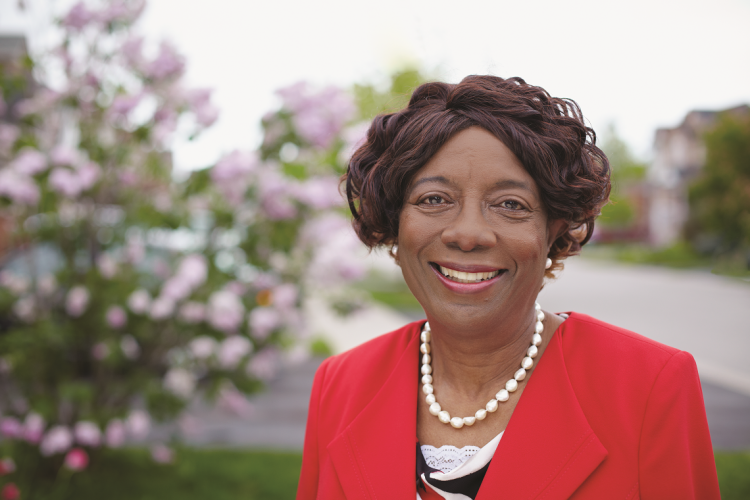
Why did you become a nurse?
I became a nurse because I wanted to help people and make a difference in their lives. My mom was a community health nurse, and she would tell us all these stories about taking care of patients. She was a good storyteller.
You have worked in nursing leadership roles for the past 26 years. What have you learned during that time that you will bring to your presidency?
I will use the leadership skills I’ve developed…in acute care, public health, primary care and mental health to inspire and challenge members to become more involved in RNAO at the chapter, region and interest group level, as well as motivate and support members through role modeling and mentorship.
I (also) hope to apply my knowledge, skills and experience in advocacy to implement RNAO policy initiatives during Queen’s Park on the Road, Queen’s Park Day, Nursing Week, and throughout the year as I represent RNAO...to influence positive health outcomes for all Ontarians.
Why did you want to become RNAO president?
Being president provides an opportunity to make a difference for nursing, the health system, and society as a whole. I have spoken out for nurses and for patients throughout my career, and I want my voice to be heard at all levels of government...as well as among RNs, NPs and nursing students. I also want to support and expand RNAO’s influence and impact provincially, nationally and internationally.
You were born in Trinidad and became a nurse there before moving to Canada in 1975. You also provided nursing care in three provinces. How will your diverse background influence your work?
I would love to continue advocating RNs, NPs and nursing students to become culturally competent. In addition to my international experience, my PhD thesis was on cultural competence, so I have done a lot of research into (this topic). I see people from diverse backgrounds (and) understand their issues. I want to try to represent them, and facilitate the development and implementation of policies and educational programs to meet their needs. Culture influences behaviour and determines decision-making. And sometimes we misunderstand people when we don’t understand their culture.
What are some of the biggest challenges you see facing nursing today?
One of the biggest challenges is health system transformation. The system needs to be transformed. Right now, we know the ratio of RNs and NPs to the population is much lower in Ontario than any other province. That means people have less access to RNs, and we know from research that RNs make a difference in producing positive outcomes for patients. We’re simply not hiring enough RNs.
The other problem is that our population is aging. In 2017, according to Statistics Canada, 13 per cent of the population in Canada was 65 or older. Seniors are expected to comprise 23 to 25 per cent of the population by 2030. If we don’t transform the health-care system to meet the needs of the aging population...we will not be able to adequately meet the needs of the whole population.
We also need to transform long-term care (LTC) to keep residents healthy and safe. We have all these unregulated staff members in LTC who do not have the knowledge, training and ability to deal with residents who have complex problems. We need to increase the ratio of RNs and include more NPs.
I’m also looking at homelessness.
We need more shelters…and we need affordable housing for low-income earners. I look at the news and I see people living in terrible conditions. Canada is supposed to be a wealthy country, and yet there are people living like this. They need appropriate shelter and affordable homes so they can help their families. Fortunately, the minimum wage went up and will continue to go up, but at the same time, the cost of living has gone up significantly.
When you’re not nursing, what other passions do you have?
Sometimes I do volunteer humanitarian work in Peru. I work as a primary care nurse when I go there. I also taught on a volunteer basis in Ethiopia, where I did research methodology seminars for master of nursing students at Addis Ababa University. My hobbies are travelling to different countries, reading, listening to classical and gospel music, attending live plays and engaging in physical activity.
Do you have any advice for those considering taking on a leadership role in nursing?
Be a “servant leader.” That means a leader who wants to serve the people around them, and who engages in practices that enrich the lives of individuals, build better organizations, and ultimately create a more just and caring world. (A servant leader) leads by role modeling and mentoring, and treats their employees and subordinates well. I have always treated people with respect and dignity, and I expect the same from them.
I would also advise them to engage in leadership roles on executive committees at the interest group, chapter and region levels (of RNAO). Maybe serve on the board of directors, (as well as) other committees and other boards. I see leadership as a service to people. When they know that you care, you will be able to influence them to do better things and make this world a better place. If I can make this world a better place in whatever position I hold, then I will have met my God-given goal for my life.
RNJ ACCESS
You are only one quick step away from full access to all RNJ content.
Already an RNAO member? Log in
